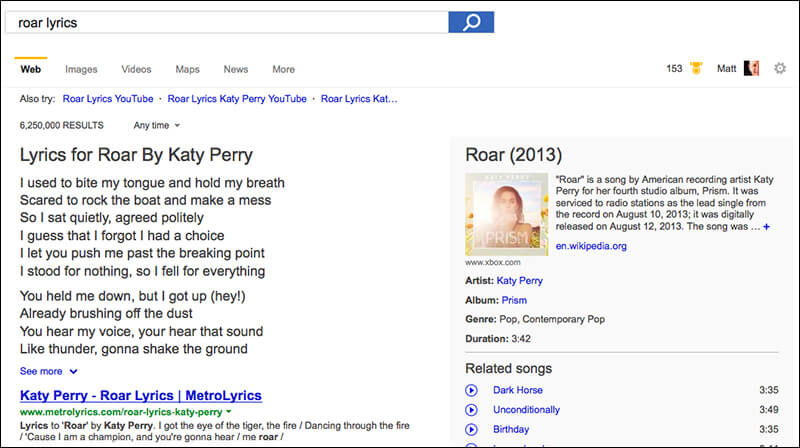Bing Starts Showing Full Song Lyrics Right In Search Results
While SEOs debate Google’s recent addition of structured data in its search results, Bing is making a similar — and perhaps more significant — change to its search results: Full song lyrics are now showing on Bing’s search results page in the US, and Bing says it plans to expand this outside the US in […]

While SEOs debate Google’s recent addition of structured data in its search results, Bing is making a similar — and perhaps more significant — change to its search results:
Full song lyrics are now showing on Bing’s search results page in the US, and Bing says it plans to expand this outside the US in a matter of months.
Bing says this is available now for more than 500,000 songs and more will be added. If you want to see it in action, Bing gives the example of In The End by Linkin Park. You can also see Led Zeppelin’s Stairway To Heaven, Roar by Katy Perry and so forth.
Bing Lyrics: How It Works
When lyrics are available, Bing shows a portion of the song and a “See more” link that leads to the entire song. On the right, Bing shows more song/artist information from its Snapshot feature.
When there are multiple songs with the same or similar titles, Bing doesn’t seem to be trying to guess which one the user wants. The song lyrics don’t show up for searches like beautiful day lyrics or magic lyrics, for example.
Lyrics may show up for songs from any music genre. They’re currently being sourced from a site called LyricFind. We’ve reached out to Bing to find out if they’ve secured copyright permission to show these lyrics. Bing tells us that LyricFind is licensed to use the lyrics, and that license extends to Bing’s display.
I can’t recall the last time Google or Bing shared any data about how many lyrics searches are done, but it’s generally believed to be a very popular type of search query — making this a significant move on Bing’s part. (A comScore spokesperson told me this morning that the company doesn’t specify the types of searches occurring on the major search engines.)
I should add a disclaimer before I continue: As someone who launched a U2 fan site two decades ago that offers song lyrics with the record label’s permission, this is an area of extreme personal interest for me.
Pros & Cons
There are pros and cons to what Bing is doing here.
On one hand, there are a lot of lyrics sites online that happen to very good at SEO but quite terrible at user experience. They rank well, but a searcher that clicks through might have to fight through multiple pop-up windows, extremely ad-heavy pages, auto-play audio or video and more. So in this sense, it might be better for searchers to be able to get lyrics right on a search results page.
On the other hand, the lyrics are on these sites are quite often wrong, and it didn’t take long for me to find mistakes. The lyrics that Bing shows for U2’s “I Still Haven’t Found What I’m Looking For” are on the left below, and the lyrics from my website are on the right — lyrics that were transcribed after careful listening to exactly what is sung, not just what shows up in an album’s liner notes.
You might say that it doesn’t really matter if every single word in a song lyric be accurate, but if search engines are going to show content, data and facts in their search results, we should expect it to be accurate, no matter if it’s song lyrics or medical information.
The other obvious implication here surrounds search traffic to lyrics sites (and fan sites like mine). According to comScore estimates for August, Bing has less than one-third the search market share that Google has, so Bing’s move may not cause a lot of harm. But imagine if Google were to start showing full song lyrics in its search results… is that something we’ll see eventually, now that Bing has taken the lead?
Postscript: This article has been updated from the original version with additional information from Bing.
(Sheet music image via Creative Commons.)
Contributing authors are invited to create content for Search Engine Land and are chosen for their expertise and contribution to the search community. Our contributors work under the oversight of the editorial staff and contributions are checked for quality and relevance to our readers. The opinions they express are their own.
Related stories

